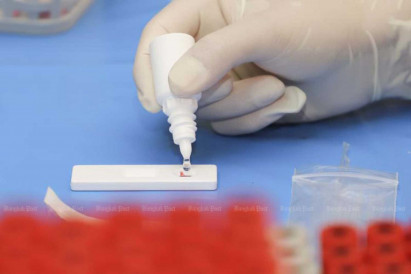Blood tests seek to identify ‘bad’ genes that make some people more susceptible

The Department of Medical Sciences is looking for the “bad” gene that makes some people prone to serious and repeated Covid-19 infections and the good gene that seems to leave others immune.
“We are testing the blood of about 2,000 people. Half of them had been infected with Covid-19 and the other half were never infected,” said Dr Surakameth Mahasirimongkol, director of the department’s Medical Life Sciences Institute.
“This is to find the particular gene that causes some people to repeatedly contract the disease, develop severe symptoms and never develop antibodies, and to find the gene that makes some people immune to the disease even though they are in contact with high-risk people,” he said.
The blood examination will be concluded this year and results from subsequent analysis should be known either late this year or early next year.
Numerous researchers worldwide have been looking into genetic links to Covid, among them the US National Institutes of Health and Gavi, the international vaccine alliance. Some studies have also been done in Asia, the director said.
The institute started its project when there was an outbreak at a shrimp market in Samut Sakhon province in 2020.
Blood samples were sent to Japan for additional examination in August last year. Researchers there found that defects in the gene that generates antibodies to the virus in some people caused them to be easily and repeatedly infected with Covid-19 although they had been vaccinated or infected, Dr Surakameth said.
“Repeat infections can happen because the disease continuously mutates or because genes cause someone to be easily infected or develop serious symptoms,” he said.
Meanwhile, blood tests on the people who have never fallen ill with Covid-19 are aimed at finding the particular gene that prevents infection.
Similar studies have been conducted to find ways to prevent other diseases, Dr Surakameth said. Among them are studies on the human immunodeficiency virus (HIV), which found the genes that prevented its infection, he said.
Such studies led to the development of medicines that could block infection channels. The successful development of such medicines might also happen with Covid-19 in ways that could more effectively prevent infection or severe symptoms, Dr Surakameth said.

